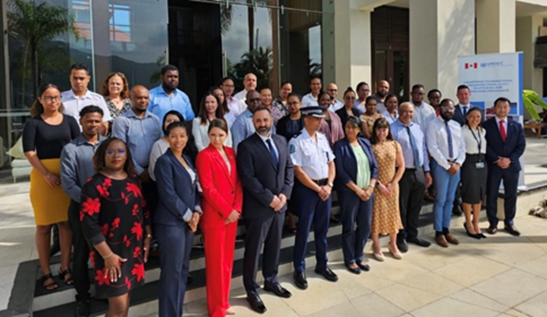UNODC Eastern Africa News and Stories
You are here: Home / News
Unlocking the Secrets of Complex Financial Crime: UNODC Empowers Seychelles AML/CFT National Taskforce to Tackle Organised Crime and Illicit Financial Flows

Illicit Financial Flows (IFFs): A universal threat to security and prosperity. With criminals and organizations constantly innovating and adapting their methods, the dangers of IFFs are ever-present. The consequences are dire, from the direct impact on national security to the more subtle distortions of economic development. Undeniably, globalisation has brought many benefits to the world, but it has also brought its share of troubles. IFFs are one of the most significant issues that have emerged from globalisation's dark side. These clandestine flows of money are unlike any other illicit or dangerous cross-border activities as they leave almost no trace. It's almost as if "pecunia non olet" - money does not smell. In contrast, identifying contaminated food, endangered species, or harmful individuals is relatively easy.
Noting that defeating the global threat of IFFs, terrorism, and financial criminality requires collaborative initiatives, with the unwavering support of the Canadian government, the United Nations Office on Drugs and Crime (UNODC) concluded a high-level training on IFFs in the Republic of Seychelles. This advanced training program was aimed at strengthening the recently established Seychelles National AML/CFT Taskforce's ability to combat the rising threat of money laundering, illicit financial flows, and terrorism financing. Canadian Law Enforcement experts facilitated the five-day training event through a case-based, in-depth overview of the Canadian Criminal Justice System, the complexities of the money laundering process, the intricate investigative techniques, management of seized assets, including conducting financial investigations with the analysis of intelligence obtained through internal disclosures and foreign sources.
The thrilling and highly engaging scenario-based workshop, which brought together a talented and diverse group of professionals from eight Law Enforcement Agencies (LEAs), explored the use of intelligence obtained through the Financial Intelligence Unit (FIU) to structure investigations and scrutinize financial crimes. With cutting-edge insights and strategies, the workshop empowered law enforcement officers to fight against financial crimes and build a safer, more secure, and sustainable global economy. “The fight against terrorism financing and other transnational organized crimes is far from over. The low rate of confiscation of proceeds from crime is empowering criminals to continue exploiting their nefarious activities while innocent victims suffer. It is high time for policymakers and law enforcement agencies to come together and work towards identifying and addressing the existing gaps in the framework for combating terrorism financing and other transnational crimes.” UNODC's Deputy Regional Representative for Eastern Africa, Ms. Maria Temesvari, reiterated this call to action.
 The sessions delivered were strategically designed to address the multifaceted challenge of thwarting the financing of terrorism and other forms of transnational organized crime in Eastern Africa. A comprehensive strategy encompassing various measures was discussed, including the enhancement of the capacity of financial intelligence units, which play a pivotal role in detecting and preventing illicit financial flows that fuel criminal activities. The speakers emphasized the pressing need to bolster cross-border cooperation to ensure that criminal networks cannot exploit loopholes in different jurisdictions to evade detection and prosecution, adding that the legal framework for prosecuting and confiscating the proceeds of crime must be fortified to effectively dismantle criminal networks and deprive them of the resources they need to sustain their nefarious activities.
The sessions delivered were strategically designed to address the multifaceted challenge of thwarting the financing of terrorism and other forms of transnational organized crime in Eastern Africa. A comprehensive strategy encompassing various measures was discussed, including the enhancement of the capacity of financial intelligence units, which play a pivotal role in detecting and preventing illicit financial flows that fuel criminal activities. The speakers emphasized the pressing need to bolster cross-border cooperation to ensure that criminal networks cannot exploit loopholes in different jurisdictions to evade detection and prosecution, adding that the legal framework for prosecuting and confiscating the proceeds of crime must be fortified to effectively dismantle criminal networks and deprive them of the resources they need to sustain their nefarious activities.
Ms. Magdala Turpin, the Liaison Officer for the Royal Canadian Mounted Police at the Canadian Embassy in Nairobi, Kenya, emphasized the urgent need for collective and decisive action to combat terrorism and transnational crime in Eastern Africa. “Given the gravity of the threat posed by terrorism and transnational organized crime, it is incumbent upon all stakeholders to take decisive and concerted action to address this critical issue and safeguard the security and well-being of the people of Eastern Africa,” she further stated.
Unleashing a powerful arsenal of initiatives and programs, UNODC is at the forefront of the global effort to combat money laundering and terrorism financing, and deter the illicit flow of finances. The organization is committed to empowering financial intelligence units by enhancing their capacity to detect and prevent these crimes. UNODC is working to improve cross-border cooperation between law enforcement agencies, enabling them to effectively identify, investigate, and prosecute criminals operating across multiple jurisdictions. But that's not all. UNODC is dedicated to strengthening the legal framework for prosecuting and confiscating the proceeds of crime, ensuring that criminals are brought to justice and their networks are dismantled.